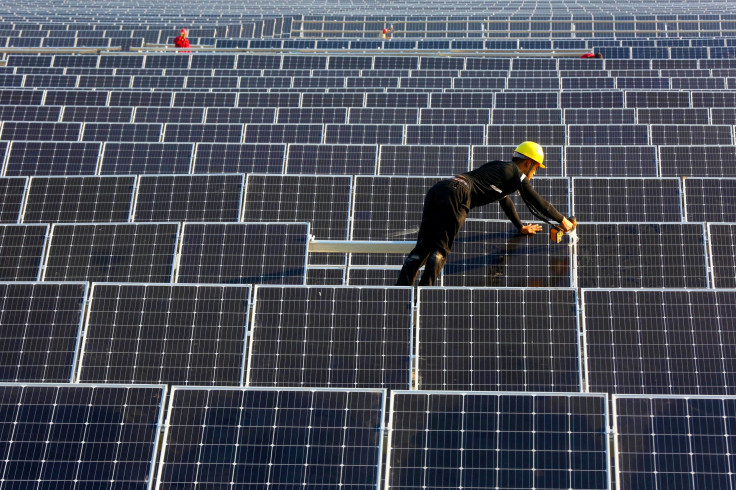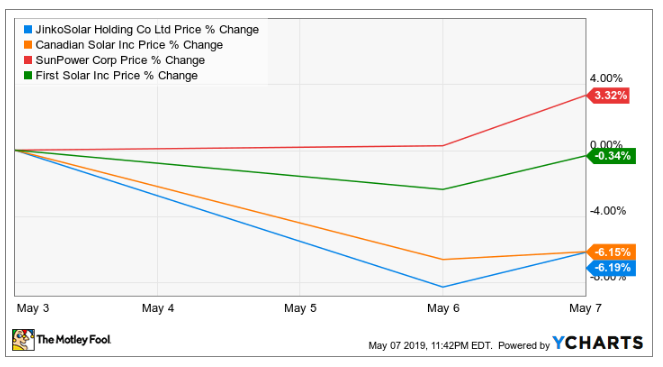Will US Tariffs Really Hurt Solar Stocks?

We've been here before. Tariffs on solar energy products have been a hot-button issue for some time now, with governments from the European Union to the U.S. to China either implementing them or threatening to at one point or another. This week, President Trump said he would impose further tariffs on Chinese solar imports, which sent shares of JinkoSolar (NYSE:JKS) and Canadian Solar (NASDAQ:CSIQ) lower. As two of the largest solar manufacturers in China, the theory is that they both have a lot to lose if higher U.S. tariffs make their products less competitive here.
Interestingly though, shares of First Solar (NASDAQ:FSLR) and SunPower (NASDAQ:SPWR), which are the largest solar manufacturers in the U.S., didn't take much of a jump after Trump made his threat. Here's why a new round of import duties may not be as big a deal for solar stocks as you might expect.

A whole new world of manufacturers
It used to be that China was the major manufacturing power in the solar industry, but that's no longer the case. After the U.S. imposed anti-dumping tariffs on China's solar exports in 2012,manufacturers responded by moving operations to other countries with low labor costs, such as Malaysia, The Philippines, Vietnam, and Mexico.
Companies in the industry have also exploited loopholes in the trade rules by moving solar panels through other countries, or finishing their production outside of China. So even if President Trump increases the tariffs on solar panels coming from China, manufacturers may be able to find some ways around them.
Growing domestic supply
The U.S. is also beginning to be a big solar panel producer. First Solar is significantly expanding its manufacturing capacity, and will soon be able to churn out 1.8 gigawatts (GW) of panels a year in the U.S. SunPower has 220 MW of annual production capacity in Oregon at the former SolarWorld Americas plant that it purchased. Both First Solar and SunPower can also import solar panels tariff-free because of loopholes or exemptions in previous tariffs. Even JinkoSolar is building a small assembly plant in the U.S.
So if the loopholes around solar imports weren't enough, U.S. production is reducing domestic demand for foreign solar panels overall.
Solar installers aren't worried
If trade conflicts were to propel a big increase in the cost of solar panels in the U.S., installers like Sunrun (NASDAQ:RUN) and Vivint Solar (NYSE:VSLR) would pay the price. But they haven't seen solar panel costs as a headwind for years, despite multiple rounds of tariffs.
The bigger driver of solar panel price moves has always been the global supply-and-demand dynamic. When demand is strong, the prices of solar panels jump more than they do under a tariff regime. When demand drops, as it did last year, price cuts can more than offset solar tariffs, which is why Sunrun and Vivint Solar don't appear worried about what President Trump might do next.
Much ado about nothing
Solar industry stocks have been on a wild ride this week; at times, it looks like the market doesn't know whether to root for tariffs or against them. At the end of the day, given all of the countries where solar panels are made today, tariffs on Chinese solar imports shouldn't have much impact on the industry at all. Even for manufacturers like JinkoSolar and Canadian Solar, their impact might not be meaningful, because both supply and demand are now so global in nature. U.S. tariffs can be shrugged off without anyone noticing.
This article originally appeared in the Motley Fool.
Travis Hoium owns shares of First Solar and SunPower. The Motley Fool recommends First Solar. The Motley Fool has a disclosure policy.





















